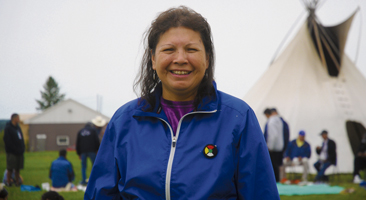
Bianca Bharti, Daily Herald
The Prince Albert Grand Council (PAGC) wrapped up their three-day Call to Action 66 event Thursday with a feast honouring Indigenous youths who have died.
The first offering was dedicated to those who died in residential schools and youths who committed suicide. The feast featured traditional fare, including caribou meat, bannock, moose liver, soups and fresh fruit.
Named after the Truth and Reconciliation Commission’s Call to Actions, number 66 “(calls) upon the federal government to establish multi-year funding for community-based youth organizations to deliver programs on reconciliation, and establish a national network to share information and best practices.”
The event, held on Peter Ballantyne Cree Nation’s urban reserve in Prince Albert, aimed at educating Indigenous youths about culture, ceremonies and ceremony protocols — facets of being Indigenous that were lost because of residential schools and the Sixties Scoop, said organizer Anita Parenteau, 51.
Over the course of three days, the youths participated in daily pipe ceremonies, elder knowledge sharing, Oskapio protocol and teepee teachings and learned about colonization, treaties and the residential school system.
“What happened in (residential) schools was passed on to the younger generation, the effects were passed on,” said organizer George Mirasty, 64.
“There were a lot of things taken away. In the residential schools you weren’t shown how to love, you weren’t shown how to parent and it carried on to our younger generation. That culture is coming back, where they’re being taught the language, the culture, the traditions.”
One event focused on what it means to be an Indigenous woman and how to handle yourself with love, care and respect, said Parenteau. The Elder spoke about lateral violence, ensuring you’re healthy and loving yourself first.
Another focused on the significance of teepees and how to raise one.
“That’s basically why we had this gathering, for them to learn who they are, where they came from and the protocols of the ceremony. All these teachings are coming back and we wanted to have this gathering to help it come back,” she said.
Both Parenteau and Mirasty spoke about their experiences with residential schools. Mirasty attended a residential school from 1960 to 1969, from ages 6 to 15.
“It took years to learn back my language and culture.” He spoke minimally about the conditions he endured: beatings, verbal abuse. What he experienced bled into his life later. He wasn’t happy with the way he treated his children. Love was absent for him going through the system, and so it was absent for his kids, he said. Through attending healing ceremonies and seeking guidance, he was able to break that cycle.
Parenteau had siblings who went through the residential school system, where sexual abuse and neglect was common.
“I grew up often protecting my younger siblings and in that experience, I became angry.” To change her ways, Parenteau went back to school and got her degree. She attended healing circles and spoke to Elders. “That’s what got me back to where I should be, to be a caring mom.”
Both mentioned the loss of the kinship system as a result of residential schools. Indigenous youths were mistreated and ignored, resulting in weaker family and cultural ties.
Around the teepees though, people were laughing, smiling and sharing stories. “That’s how it’s supposed to be,” Parenteau said.

